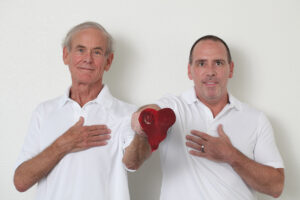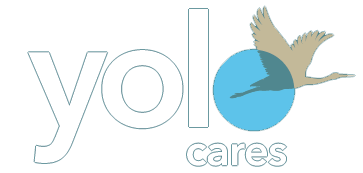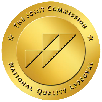Sock Drawer Letters
By: Craig Dresang, CEO, YoloCares

There is a corner of my sock drawer reserved for timeworn letters that I received from my parents after I left home to find my place in this big crazy world. I occasionally take them out to reflect on the encouragement and love captured on the now yellowed pages. Recently, for the first time in decades, I added a letter to my stash.
This past month, I had the profound privilege of being with and embracing the board president who hired me 11 years ago as he said his farewells and took his last breath. He was surrounded by an adoring family and a few close friends in his Davis home.
Tom Frankel, former YoloCares board president, patient-care volunteer and philanthropist, was the guy who convinced my husband, Joey, and me to move from Chicago to Northern California. Although, truth be told, we did not need much convincing.
The first time I met Tom in person was during the Fourth of July weekend in 2014 at YoloCares’ campus on Galileo Court. It was 108 degrees. I arrived in Chicago style . . . dark wool suit, starched white shirt, my grandfather’s ruby cufflinks, red tie, and wingtip shoes. Tom, who was president of the board, walked into the conference room wearing wrinkled shorts, a tee-shirt and sandals. I was jolted by the fact that I could see his bare toes. “Welcome to northern California Craig,” he said. “If this works out, you might want to reconsider your wardrobe.”
I had a day-long series of interviews with the crew from YoloCares (then Yolo Hospice). It involved a two-hour grilling session with the entire 16-member board followed by a group interview with 40 employees and then lunch at Bistro 33 in downtown Davis.
What followed from that day was a decade-long adventure that neither of us could have imagined. It was an unfolding of events and circumstances that would challenge us personally and professionally. It was a journey that tied us together, stretched us, and changed us for the better, and for the rest of our lives.
From the first day Tom walked into my life until his last day here, he believed in me . . . in the same way my parents did. There were times that we had some painful and scary decisions to make. He would always ask questions and challenge me the same way a good attorney would. His job, he told me, “Is to play devil’s advocate and make sure you, and we, are thinking of every possible angle.” Afterwards, he would tell me that he supported my judgement, my counsel, my decisions. He trusted that I would never make big decisions without his and the board’s full knowledge and support.
The attorney in Tom was never comfortable moving forward with a decision unless he had all the facts, and he knew, beyond a shadow of doubt, that it was the best decision for the agency. He quickly saw that same quality in me too. We shared an identical commitment to protect, and make better, this community-birthed, community-owned, and community-governed treasure. When we had to carry blame or sport a few black eyes (figuratively speaking), it did not matter. What mattered was honoring the organization’s founding vision and securing the future of YoloCares, not for our benefit, but for the benefit of the communities that gave it life. Tom understood, as I did, that we are temporary stewards of something bigger than any of us, and of something that, if we get it right, will outlive both of us . . . and will benefit generations of families who we will never know.
Under Tom’s leadership on the YoloCares board, the agency secured Joint Commission accreditation, launched one of the State’s first community-based palliative care programs becoming the first of its kind to achieve Joint Commission certification in Northern California, and secured its first million-dollar grant from the Yocha Dehe Wintun Nation to better understand and address the barriers to end-of-life care for rural and indigenous people.
Under his watch the agency first became a nationally ranked Best Place to Work, merged with Citizens Who Care, opened Galileo Place (Davis’s first adult day program), and began the years-long process of assuming ownership and operations of Joshua’s House (the West Coast’s first hospice home for otherwise unhoused individuals). With his support and co-piloting, YoloCares’ quality scores soared and the agency more than tripled in size and reach. Today, partially because of his decades-long commitment, YoloCares’ quality scores are in the top five percent of all 1,700 hospices in California.
This is the power that a good board president and board leader can unleash. Tom was my boss, my mentor, and my California dad. Yet, it would be untruthful to say we never had our bumpy moments and disagreements. But we always worked through them with transparency and with an understanding that sticking together through the worst of storms will strengthen both us and the agency.
I try to instill an important leadership principle with my team: Be friendly with people who report to you or who you report to, but do not become close friends. Blurring those professional boundaries between a leader and their team can only lead to dysfunction and possible trouble. Partially, because there will always be an imbalance of power so the relationship will never be equal.
That leadership principle caused me to uphold certain boundaries with Tom. Only when he retired from the board, did I feel comfortable fully embracing his friendship. His departure from the organization’s board cleared the path for a deep, meaningful and equal relationship. When his health declined and he needed YoloCares as a healthcare provider, I signed up to be Tom’s palliative care and hospice volunteer. He became my patient but always remained my mentor. I believe that I benefited more from our weekly visits than he did. He was always gracious and generous, and loving in a very fatherly way.
Four days after Tom died, I received a letter in the mail from him. It starts out by saying, “Craig, when you receive this letter, I will be deceased.” And the next two-and-a-half pages are filled with gratitude, words of support, and an affirmation of our special relationship. The only other person who has written letters like this to me was my own father. I have a short stack of them, now decades old, in my sock drawer. Tom’s letter is now on top.





Peter Maier
I have a stack of letters like that too. Thanks for validating such a collection and its palliative care.